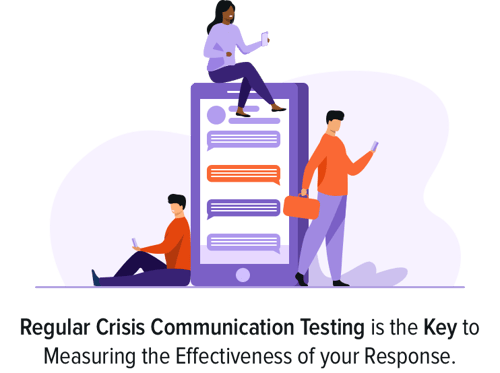Seven Crisis Communications Examples Every HR Professional Should Have

A crisis can affect your company at any time. As of this writing, the COVID-19 pandemic has gripped the world and has changed the way we think about communication, contact, and work as we once knew it. The world has never had to deal with large-scale social distancing and contactless norms as we’re currently dealing with.
Crisis management is essentially an HR function. To react appropriately to a crisis, everyone in your organization has to be on the same page. Crises tend to spring up unexpectedly, and communication during such times is of paramount importance. As tough as these times can be, they present a rare opportunity for you to enhance your company’s standing with your customers.
Chief Executive Officer of Medlinks Cost Containment, Inc. and Medlinks Staffing, LLC.
“Our staff has praised the increased communications level Workmates delivers. We use it to communicate important project matters and give staff specific ‘kudos’ or even recognize their birthdays. More importantly, we use Workmates to clarify important project details that needed rapid dissemination among the entire team.”
Currently, companies are being forced to operate remote working models, and this makes communication more challenging. Teleconferencing tools have made this task easier, but how can you ensure that everyone in your organization is getting the message?
It’s a real challenge, yet here are seven crisis communication best practices you should implement in your company.
1. Prepare
The old saying is true: “Failing to prepare is preparing to fail.” You may not be able to anticipate the exact nature of a crisis but creating response plans and educating employees with regards to what a crisis looks like is essential. Your employees will appreciate having a crisis response template.
There are two plans that you should have in place above all else: Your business continuity plan and crisis recovery plan. Your business continuity plan and crisis recovery plan. The former ensures your organization will not be crippled during a crisis, and the latter will help dictate your response to the situation.
Adopt tools that allow you to quickly broadcast company-related announcements to your staff. Calling everyone on the floor to an all-hands meeting is impossible these days, and this is why you must define platform login and monitoring protocols. If your employees know what's expected of them before a crisis hits, they'll react in a coordinated manner once the situation becomes critical.

2. Identify crisis communication management teams
Who are the key people you need to deal with a crisis? Identify and train them beforehand to help them do their jobs well during a crisis. With remote workforces, communication between team members is crucial since face to face interaction isn't possible.
Create dedicated communication channels for this team and empower them to create sub-channels to help them achieve their goals. During a crisis, it's impossible to know what your team will need, and this is why using highly customizable software is essential.

3. Notify
Crisis communication is all about ensuring there are no stones left unturned when it comes to delivering your message. This approach applies to your internal communication as well. Aside from broadcasting announcements on your software platform, make sure your employees receive notifications on their phones and email as well. These messages should be delivered via SMS/mobile apps and other functionality within a modern, social intranet.
Restrict sending such notifications solely for critical moments. You don't want your employees to tune out your messages by sending them irrelevant updates and announcements.

4. Encourage responses with employee advocates
The old way of responding to a crisis was to batten down the hatches and restrict employees from talking about it. In the era of social media, not only is this the wrong approach to adopt, but it's also impossible to enforce. People turn to social media for information, and ignoring social conversations involving your company will damage your brand.
Encourage your employees to interact with customers and followers on your accounts and give them to become brand advocates. Designate responsible employees or have someone from your crisis recovery team assume control of your accounts. Make sure your employees are up to speed concerning communication tone and response protocols.

5. Accuracy (not just speed)
Your first instinct when a crisis hits will be to respond quickly to put out fires. However, an inaccurate or false response will only make the situation worse. Instead, focus on communicating honestly, and your employees will follow suit. Encourage your crisis management team to explore the situation and provide constant updates in your internal communications to all of your employees.
Above all else, never go silent. If your organization is gathering the facts surrounding the case, then communicate this internally and externally. Remaining silent conveys dishonesty and will damage your brand's reputation.

6. Test
Regular crisis communication testing is the key to measuring the effectiveness of your response. Craft response templates in advance and share them through your HR platform to gather feedback from your employees.
Share these test responses in different communication channels to gain a well-rounded picture of what your employees think. Sharing it across the entire organization at once and opening the floor to feedback from everybody might result in you getting lost in the weeds.
Make sure you include relevant personnel contact information in these templates. Your employees can then use their HR mobile app to get in touch instantly with these people when the crisis hits.

7. Review
Once a crisis passes, review your workflow with your crisis management team. Gather feedback from employees through your HR platform's channels and incorporate this into your response moving forward.

Find the opportunity in a crisis
A crisis will test your organization thoroughly, but it's also an opportunity for you to bounce back stronger than ever. Communicating decisively and clearly--with the right crisis communications plan—with your employees will help you respond as one to the crisis and will enhance your reputation. It will also bring your employees closer to one another thanks to having dealt with the situation together.

To learn even more about managing remote teams and keeping employees working at home highly engaged, download our ebook now.
Download nowWith the workplace going remote these days, communication is of paramount importance. To learn many more tips, tricks, and best practices for communicating with remote teams, download our eBook,“A Better Way to Communicate, Engage, and Recognize & Reward Remote Workers.”
About Author: This article is written by a marketing team member at HR Cloud. HR Cloud is a leading provider of proven HR solutions, including recruiting, onboarding, employee communications & engagement, and rewards & recognition. Our user-friendly software increases employee productivity, delivers time and cost savings, and minimizes compliance risk.

Keep Reading
Balancing Technology and the Human Touch in Employee Engagement
Companies are taking employee engagement very seriously because it is one of the ways of
Building Strong Teams: The Power of Team Bonding Exercises
Never overestimate the power of collaboration as a core element of effective team

